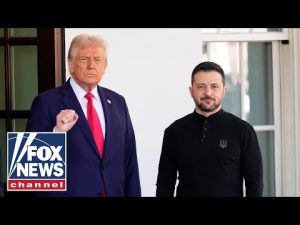Ah, the ever-turbulent waters of international diplomacy. As we await the next chapter in the saga between Ukraine, Russia, and the other big players involved, it’s hard not to notice who’s stepping into the role of mediator: none other than former President Trump. It’s like watching an unexpected duet where the parties involved might not even particularly care for each other’s tune. Yet, here they are, summoned to center stage by a man who’s never been known for enjoying a back seat. Ambassador Matt Whitaker provides some insight into what’s expected from the upcoming meeting, which is being billed as yet another “important next step” in the process of inching towards peace.
Here’s what’s really going on: Zelenskyy comes to the White House armed with a counterproposal to whatever Russia lobbed during their previous meeting in Alaska. President Trump, playing the part of the ultimate negotiator, will attempt to bridge these grand divides. It’s as though we’re all guests at an elaborate dinner party where not everyone likes the menu or even wants to sit next to each other. Yet everyone knows this dinner must happen because, frankly, enough is enough with this conflict. After all, Trump’s got oceans to cross and peace deals to broker, with no time for dessert until both sides finally agree on something.
Now, let’s not forget about the role of NATO and the broader scope of international security. It seems Trump has been holding the Europeans to account, reminding them of their dues to NATO—a rather muscular display of diplomacy. As much as one might enjoy blaming the U.S. for getting involved in these tangled global issues, in this particular orchestra, every EU member has their part to play, and they’re finally doling out the 5% agreed contribution to strengthen NATO. The hope is that a fortified NATO will coax Russia into keeping this a handshake table instead of a battlefield playground.
There’s also some economic maneuvering on the agenda. With Russia’s oil situation and the ongoing sanctions being tossed around like confetti at a poorly planned parade, this economic chess game is more than just a prelude to lunch—it’s a decisive factor in negotiations. The big brains of Europe are already pondering future steps in rebuilding Ukraine post-conflict, especially as they prepare to convert their GDP percentages into defense spending. A hefty investment in military might, it seems, is not just a fantasy anymore but a real-world requirement.
As this high-stakes meeting at the White House approaches, everyone has their fingers crossed that Trump, hailed as the prolific dealmaker, will play the Mendelssohn to this unfolding diplomatic symphony. They say he doesn’t care for the bloodshed, which, one might add, is a sensible position if ever there was one. Trump’s aim is to maneuver these global powers toward some resolution. The hope is that out of this meeting, a lasting peace framework might just be the dessert the world needs—assuming, of course, that there’s an appetite for it amid all the haggling over land and security.







